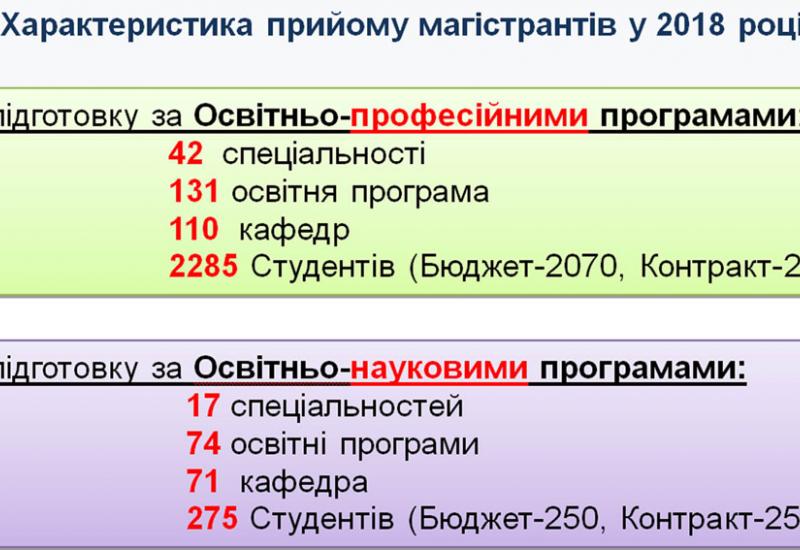On November 22, 2018, an enlarged meeting of Methodological Council of the university with the participation of the Directors of the Institutes, Deans of the Faculties and Heads of the Departments took place. An urgent matter for the university about preparing holders of a master’s degree was considered at the meeting.
The task of the magistracy lies in preparing the professionals in a certain subject field, able to combine comprehensively research activities, project work and entrepreneurship in order to contribute to development of innovative economy and establishment of highly-effective production structures.
On average for the country, enrolment in magistracy (state-financed education) was about 50% of the bachelors’ graduation, this index reached 75% at our university.
A high-priority mission during preparing master’s students is providing them with
qualitative education and practical training on the basis of innovative component and teaching technologies.
The principles of organization the education of the second (master’s) degree are:
- Increase of fundamental element in the content of studying
- Providing training based on scientific researches on relevant topics, which are undertaken by certain graduating department chairs and Masters’ supervisors
- Developing a competitive environment for students, graduating department chairs and scientific supervisors
- Strict coherent competitive selection of talented students
Admission to the magistracy has been on competitive basis from entrance exams results and academic rating (total of academic and artistic constituents) at our university for ten years. Admission to the magistracy has been done according to Educational and academic and Research and academic preparation programmes since 2016.
The details of Organization of Educational Process are:
- Education focused on individual educational plans
- Involving the latest technologies of education
- Implementation of graduation qualification work in the form of master’s thesis
Moreover, master’s thesis of practical profile is a result of independent innovative solution of assigned applied target based on famous theories and methods, and master’s thesis of academic profile is a result of the research of a certain object, its characteristics, properties, made independently, that is researches (creative developments) of problems of appropriate field.
Education of master’s degree programme is conducted under the direction of supervisor according to student’s individual plan and relies on student’s active independent work. The supervisor report about execution of individual educational plans by every master’s student at Department Chair’s meeting once a semester.
As for membership of masters’ scientific supervisors, they must have a level of scientific and professional experience, which is verified by not less than 7 kinds and results of professional activity, which are determined by license agreements.
The magistracy trains graduators for the future professional or scientific activity, so transition to target training with following employment is preferential. Cooperation with enterprises and institutions, which are potential employers and join practical training in the form of bases of practice and the Chair’s material and technical equipment development, is one of the conditions of the Chairs’ activity in this direction. Graduate Chairs of the university works in this way, and 77% of them are well-connected with 169 partner enterprises, which are powerful in productive and scientific sense. The shift to dual form of organization the educational process, where the partner enterprises take up practical training, is the most effective way of development such cooperation. There are positive examples of realization this work with companies “Progresstech-Ukraine”, “Samsung Electronics” and State enterprise "Ukroboronprom" at the university.
During the inculcation of new model of training (by model of dual education) the demand for extension of blended learning educational technology, which combines face-to-face and remote forms and is based on new teaching skills, arises. The technologies of blended learning give possibilities to organize educational process in small-numbered groups, which are masters’. In such a way, for example, the Chair of cyber-security uses the technologies of blended learning within master’s degree training in 24 academic subjects.
Methodological Council adopted a decision, based on the results of addressing the issue of state of masters’ training at the university. This decision is aimed at improvement of the quality of masters’ training.
The compulsory elements of masters’ training are:
- Popularization of scientific schools and university’s achievements for the purpose of increased involvement of applicants from other institutions of higher education in order to implement a real competitive selection and qualitative recruitment to the magistracy.
- Improvement of the content of educational programmes, which are based on system-building and specialized classes, which are relevant to the second degree of higher education and form the ability of independent creative work.
- Inculcation of modern forms and components of educational process, which are based on building partnerships between a teacher and a student. Growing of the importance of student’s role in educational process, including blended learning, scientific seminars, practical training, innovative festivals, projects, startups.
- Increasing of demanding at all stages of masters’ training with priority forming of the ability to solve scientific and creative tasks independently, including the development of individual and independent work to explore both chapters and coherent subjects’ courses based on technologies of blended learning.
- Transition to masters’ targeted training working directly with the employers in particular by dual form of organization the educational process for the purpose of effective employment.
- Development of English-speaking education and using a foreign language in all aspects of educational process in order not only to possess the professional terminology, but to be able to report the results of the researches to the scientific community, participation in programs of double diplomas and academic mobility.
- Loyalty of formal demands at all stages of educational process and preparation the thesis, including meeting the requirements of academic integrity and increasing of heads’ personal responsibility. Improvement of transparent control system and feedback in the magistracy.
- Meeting the requirements brought by normative documents to the membership of Scientific-pedagogical workers in particular during accreditation of educational programmes.

